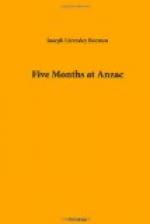Tobacco, cigarettes and matches were on issue, but the tobacco was of too light a brand for me, so that Walkley used to trade off my share of the pernicious weed for matches. The latter became a precious commodity. I have seen three men light their pipes from one match. Captain Welch was very independent; he had a burning glass, and obtained his light from the sun. After a few days the R.M.L.I. were ordered away, and we were directed to take up their position on the beach. A place for operating was prepared by putting sandbags at either end, the roof being formed by planks covered with sandbags and loose earth. Stanchions of 4 x 4 in. timber were driven into the ground, with crosspieces at a convenient height; the stretcher was placed on these, and thus an operating table was formed. Shelves were made to hold our instruments, trays and bottles; these were all in charge of Staff-Sergeant Henderson, a most capable and willing assistant. Close by a kitchen was made, and a cook kept constantly employed keeping a supply of hot water, bovril, milk and biscuits ready for the men when they came in wounded, for they had to be fed as well as medically attended to.
INCIDENTS AND YARNS
One never ceased admiring our men, and their cheeriness under these circumstances and their droll remarks caused us many a laugh. One man, just blown up by a shell, informed us that it was a —— of a place—’no place to take a lady.’ Another told of the mishap to his “cobber,” who picked up a bomb and blew on it to make it light; “all at once it blew his —— head off—Gorblime! you would have laughed!” For lurid and perfervid language commend me to the Australian Tommy. Profanity oozes from him like music from a barrel organ. At the same time, he will give you his idea of the situation, almost without exception in an optimistic strain, generally concluding his observation with the intimation that “We gave them hell.” I have seen scores of them lying wounded and yet chatting one to another while waiting their turn to be dressed. The stretcher-bearers were a fine body of men. Prior to this campaign, the Army Medical Corps was always looked upon as a soft job. In peacetime we had to submit to all sorts of flippant remarks, and were called Linseed Lancers, Body-snatchers, and other cheery and jovial names; but, thanks to Abdul and the cordiality of his reception, the A.A.M.C. can hold up their heads with any of the fighting troops. It was a common thing to hear men say: “This beach is a hell of a place! The trenches are better than this.” The praises of the stretcher-bearers were in all the men’s mouths; enough could not be said in their favour. Owing to the impossibility of landing the transport, all the wounded had to be carried; often for a distance of a mile and a half, in a blazing sun, and through shrapnel and machine-gun fire. But there was never a flinch; through it all they went, and performed their duty. Of our




